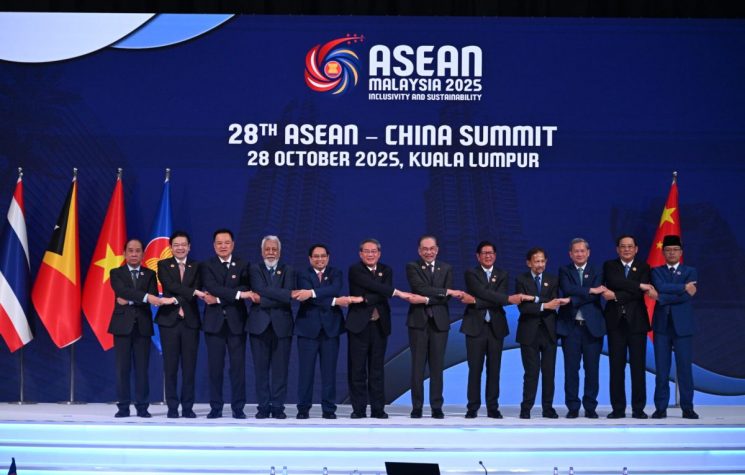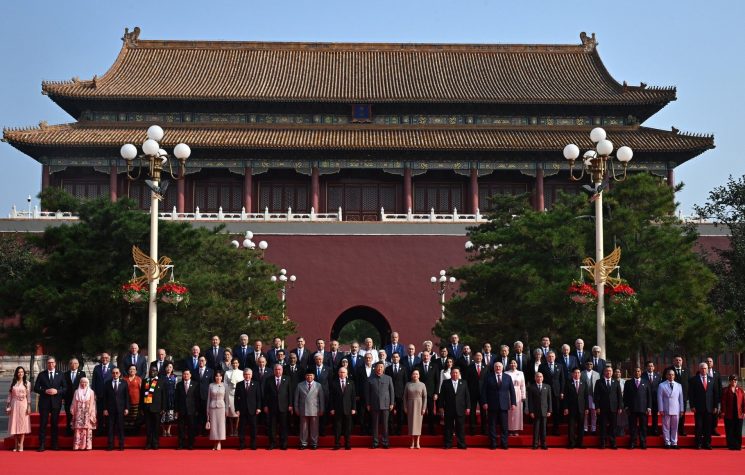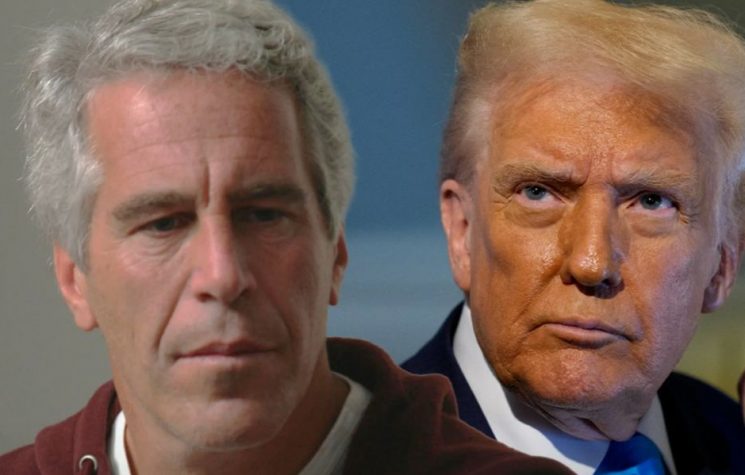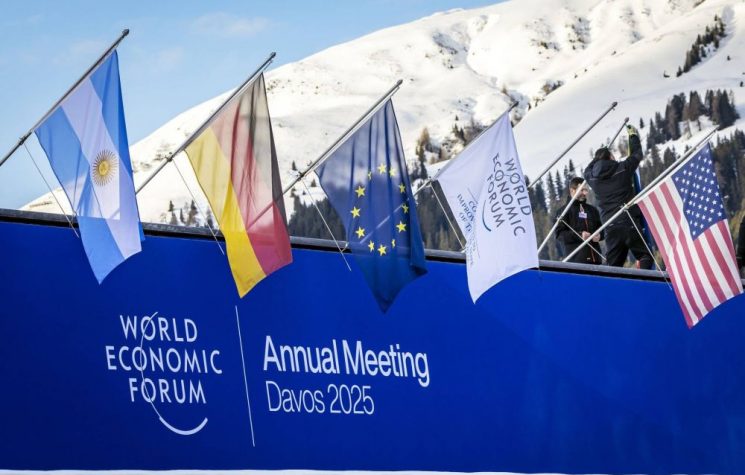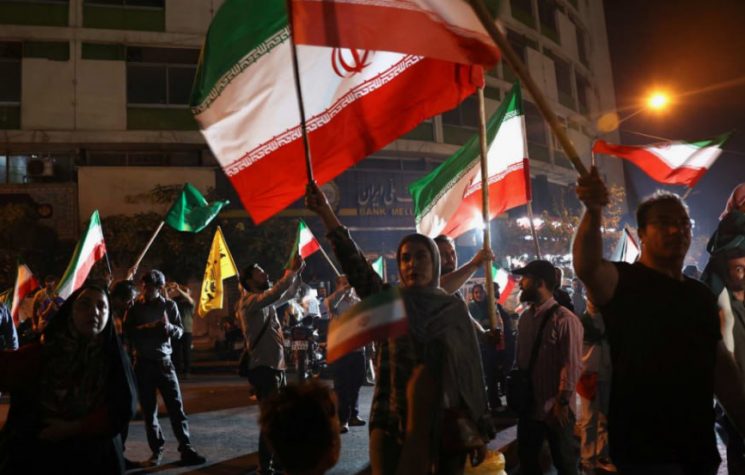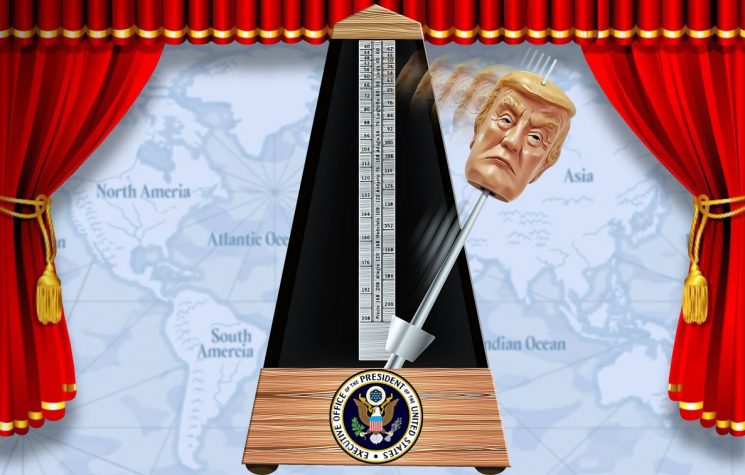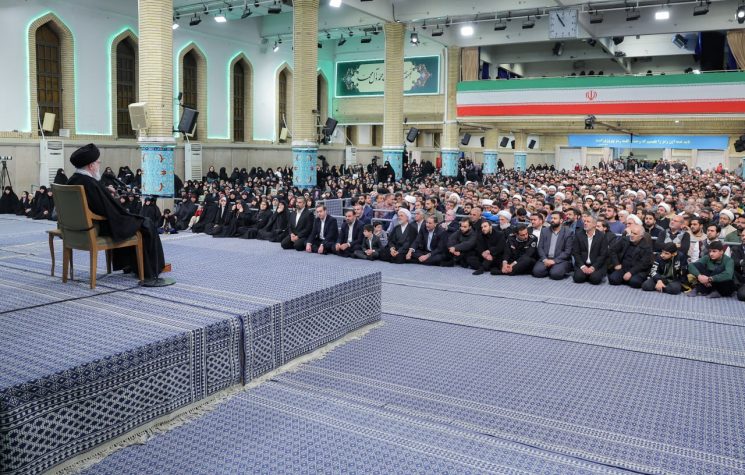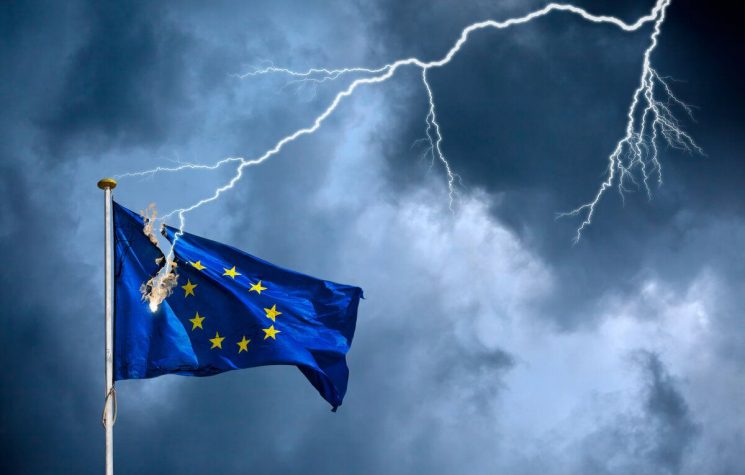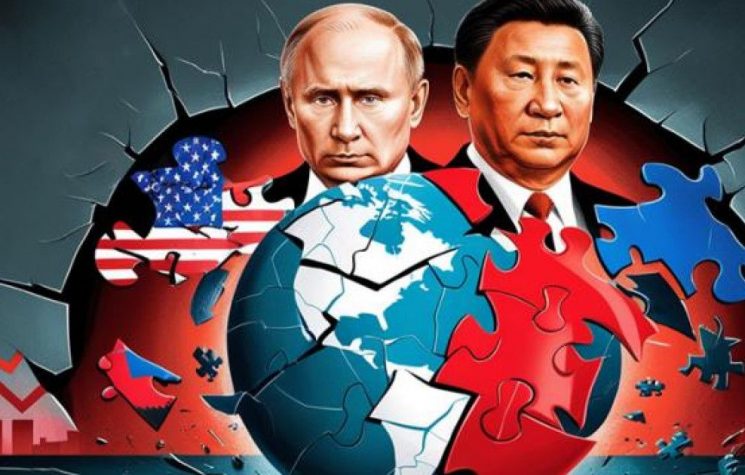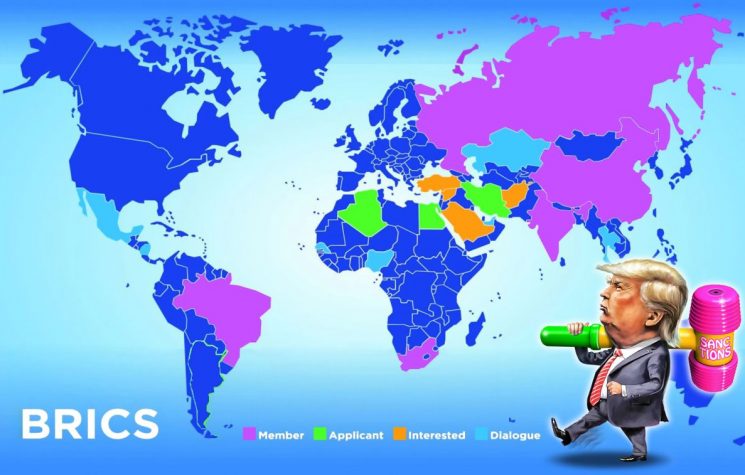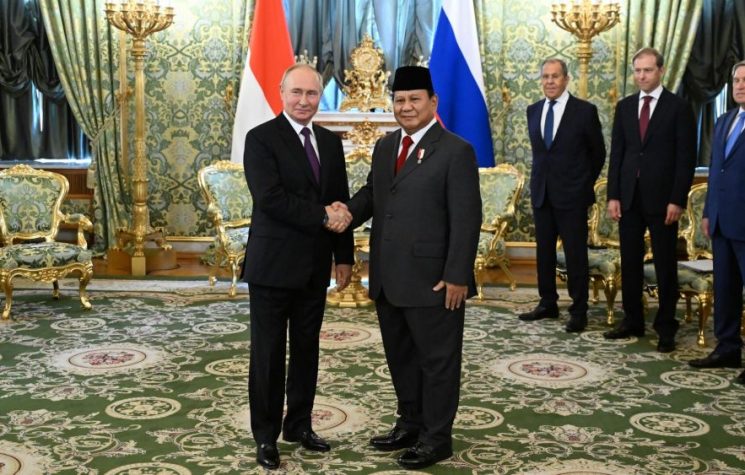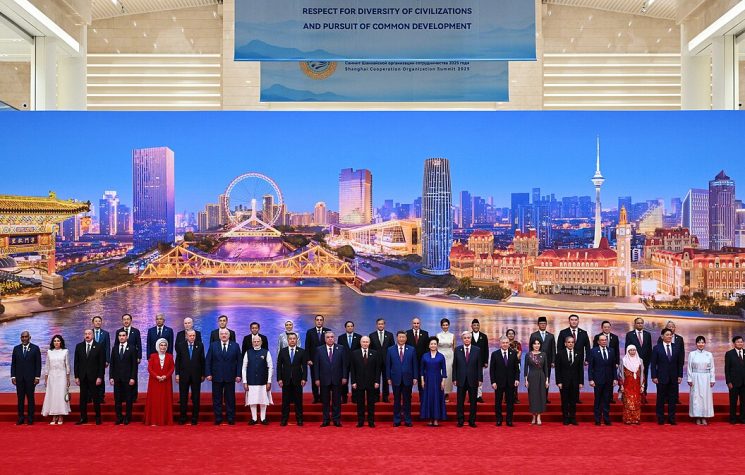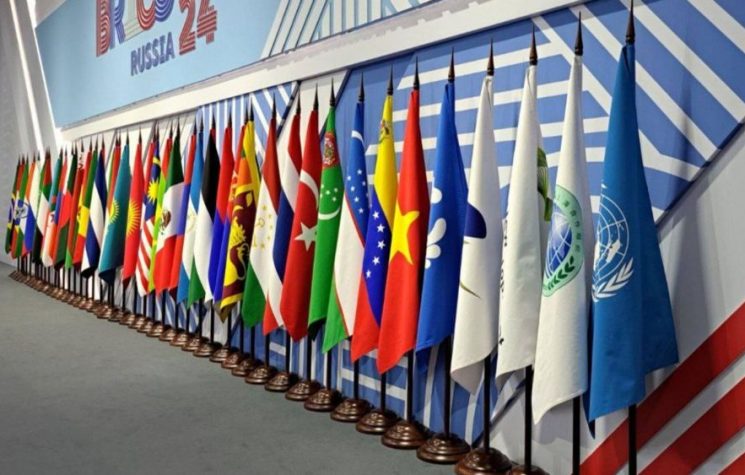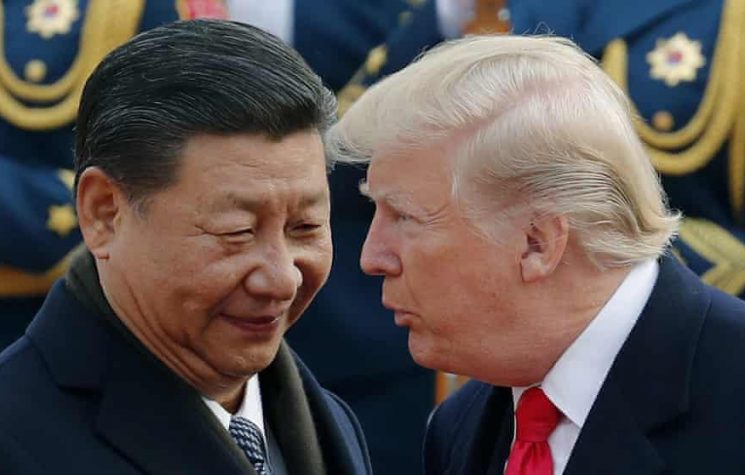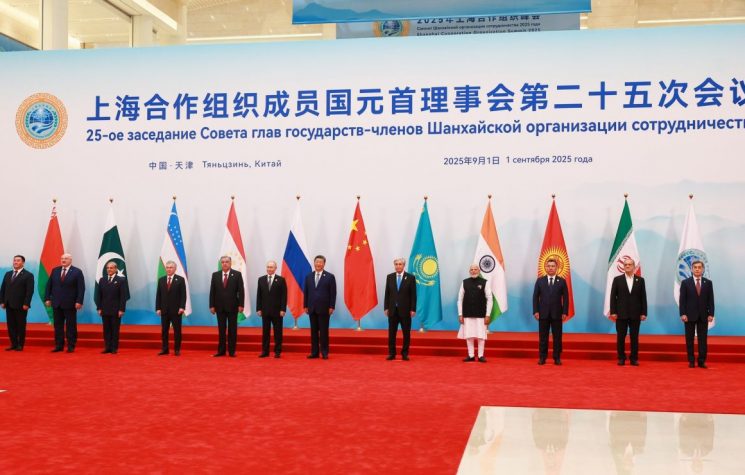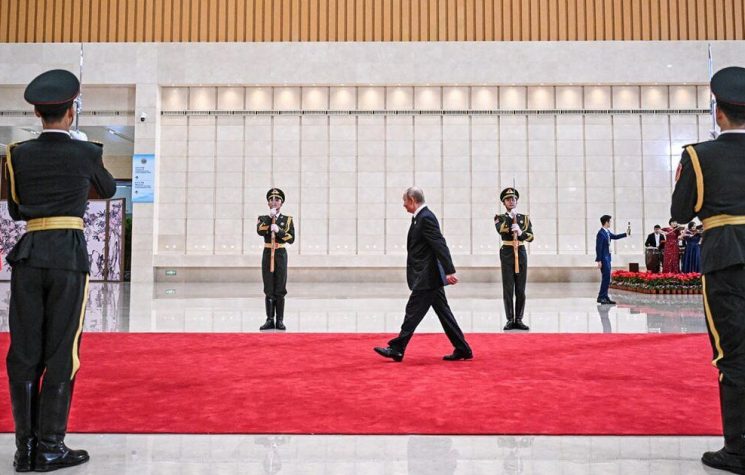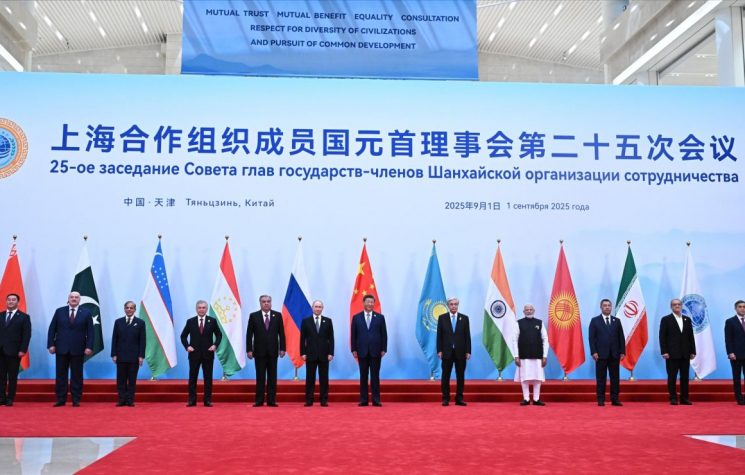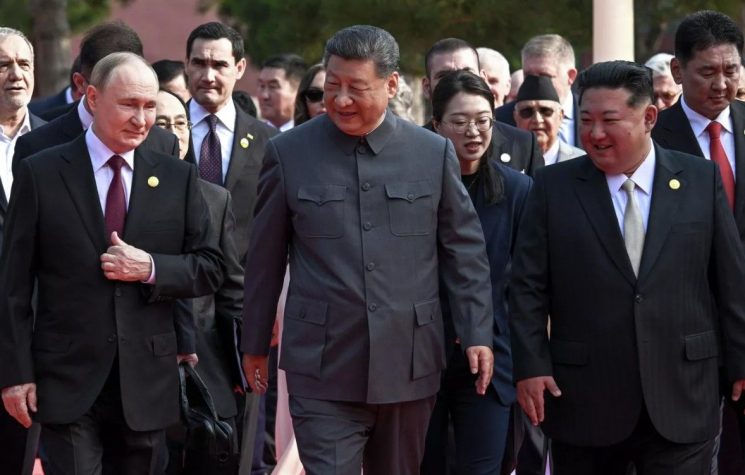Does Trump even enjoy the leeway from his unseen bonds to seize on nuclear détente as his Nobel Prize story, should he so choose?
Join us on Telegram![]() , Twitter
, Twitter![]() , and VK
, and VK![]() .
.
Contact us: info@strategic-culture.su
The gloves are off. The SCO Summit was a clear demonstration of the reality of power starkly coalescing, on the one hand, and one of power visibly ebbing, on the other. The amazing military parade was the summit counterpart – it spoke loudly: You want to take us on? ‘We are ready’.
China has thrown down the gauntlet with precision timing. (You’d almost think they had planned it that way …). ‘History is being written – in Russian and Chinese ink’, observed one Russian commentator.
Western political systems are in turmoil, beleaguered by populist politics promising everything, yet lacking the tools by which to resolve anything. Western alliances are riven by doubt and uncertainty, with political stability fissuring under pressure from the failures of western borrow and spend policies. Even The Economist concedes that “a new reality is taking hold”.
Trump’s reaction to the SCO spectacle was a snarky dig at some perceived anti-American ‘conspiracy’. Yet, if he feels himself to be the ‘wallflower’ to this gathering of ‘friends’, it is because he chose not to go to Tianjin. He has only himself to blame. Should the SCO become defined in the western psyche as anti-western, then that too will be largely down to Trump – and how he chooses to frame the U.S.’ future.
Xi made this latter point in his opening speech: “Humanity is again faced with a choice of peace or war, dialogue or confrontation, and win-win outcomes; or zero-sum games”.
Unfortunately, Trump is probably too far down the road of pursuing American ‘exceptionalist greatness’ to expect much of a nuanced response from him. But then again, Trump often does seem to defy the obvious.
The default psychological mode of the West will be defensively antagonistic. The U.S. clearly has not been prepared psychologically to go onto any sort of equal footing with these SCO powers. Centuries of colonial superiority have shaped a culture where the only possible model is hegemony and the imposition of pro-Western dependency.
To acknowledge China, Russia or India as having ‘detached’ from the ‘Rules-based Order’ and constructed a separated non-western sphere clearly implies accepting the end of western global hegemony. And it means accepting too, that the hegemonic era as a whole is over. The U.S. and European ruling strata are categorically not in the mood for this. The European ruling strata, like true believers, continue to bristle with hostility toward Russia.
So for the Europeans, there is no question that they too felt something judder, but did not understand what exactly had caused the tremor – and thus decided on rudeness as a response. Friedrich Merz stated his belief: “Putin is a war criminal. He is perhaps the most serious war criminal of our time that we have seen on a large scale. We must be clear about how to deal with war criminals: There is no room for leniency”.
The reality (and the little that we know) of what has emerged from China’s Tiananmen Square parade will undoubtedly cause consternation in Washington, Brussels and London: President Xi declared China’s rise to be “unstoppable”, whilst showcasing over 10,000 troops marching in perfect synchronicity and revealing impressive new Chinese weaponry (a nuclear, 20,000 km range ICBM; a laser-powered interceptor and giant underwater drones).
Most notably, President Xi (also for the first time) showcased the PLA’s land, sea, and air-based nuclear force – a complete and deadly triad.
At the victory celebration parade, Xi stood proudly with his U.S.-sanctioned allies, and sat on the dais with Kim Jong Un directly to his left and Putin to his right – a symbolic line up few can have expected. Equally, the bonhomie evident between Putin, Xi and Prime Minister Modi clearly was real and not contrived.
The practical output from the summit too will nonplus the West. The announcement of the Siberia 2 pipeline, Blomberg notes, effectively puts an end to plans for U.S. ‘energy dominance’.
As Blomberg’s editorial put it, “China may now stop importing more than half of its foreign LNG, and by the early 2030s, the share of Russian gas in China’s needs could reach 20%. Analysts quickly calculated the implementation of the Power of Siberia 2 project is equivalent to a drop in demand of about 40 million tons of LNG per year”.
“This means that many LNG production projects, which the U.S. had bet on, no longer make sense”.
What will be the other sequellae? The U.S. and European dark State will not take these events lightly. In their hostility, their anger will likely focus on Russia first and foremost (via Ukraine), and in parallel, via Russia and China’s strategic ally, Iran.
During the summit, Xi proposed the creation of a new international security and economic order, explicitly challenging the existing U.S.-led institutional system. He described the initiative as a step toward building a multipolar world. And having announced it – the first specific piece of SCO ‘action’ followed directly.
China and Russia joined Iran in rejecting a European initiative to reinstate UN sanctions on Tehran through the ‘snapback mechanism’. A letter signed jointly by the Foreign Ministers of China, Russia and Iran, and addressed to the UN Secretary General, stated in uncompromising terms that for the E3 to trigger ‘snapback’ provision “clearly contravenes the resolution, and therefore, is by default, legally and procedurally flawed. The E3’s course both abuses the authority and functions of the UN Security Council – whilst misleading its members as well as the international community concerning the root causes of breakdown in the implementation of the JCPOA and the UNSCR 2231”.
Harsh language, which nonetheless may not prove sufficient to stop the sanctions snapback from coming into effect in 30 days from the 28 August transmission of the E3 letter to the Security Council.
The E3 claim that their action actually provides ‘space’ for Iran to negotiate a return to full JCPOA compliance – but this is belied by the E3 tying the 30 day negotiation period to new demands for Iran’s missile inventory and its foreign policy posture to be integral to any agreement. They know that these further elements will never be accepted by Iran.
The E3 therefore effectively are setting up Iran for military action through the introduction of unrealisable conditionality.
It is clear that China and Russia’s statement implies that they will not comply with any snapback sanctions should they be imposed on Iran.
Trump periodically claims that he does not want war with Iran, but nonetheless, he already struck Iran’s nuclear facilities (on 22nd June).
The ‘snapback framing’ with its punitive conditionality seemingly intended to incur a breakdown in diplomacy did not arise out of the blue.
Recall that it was Trump, who in February 2025, signed a National Presidential Memorandum (a legally binding injunction) that U.S. objectives are to be that ‘Iran be denied a nuclear weapon; intercontinental ballistic missiles and that ‘Iran’s network and campaign of regional aggression be neutralized’”; that the Treasury Secretary should implement maximum sanctions pressure on Iran; and the U.S. representative to the UN should work with key allies to complete the ‘snapback’ of international sanctions and restrictions on Iran, whilst holding Iran accountable for its breach of the Nuclear Non-Proliferation Treaty (amongst many other provisions included in the memorandum)’.
The February 2025 Presidential Memorandum set the table towards either eventual military action against Iran – or Iran’s total capitulation. Denying Iran its missile defence and links to regional allies was always a non-starter. Yet here these demands are resurfacing again with the latest E3 demands. Who’s behind this? Trump, and behind him – Netanyahu.
Round one on Iran has already been tried, and now, forces behind the scenes are pressing for a further round. They see Iran strengthening, Israel weakening, and the window of opportunity shortening. They are in a hurry.
The other strand of western retribution to the SCO ‘impudence’ in standing aloof from western primacy likely will take shape in Ukraine. More pressure, military and financial on Russia, will be the demand by the Europeans and Zelensky.
Russia no doubt briefed colleagues at Tianjin that it intends to convey the message to Trump that Russia will be continuing the Special Military Operation until all the set tasks and goals are fully achieved (since Washington seems unable to control the Ukrainians and Europeans). Should matters take a different course, Russia stands ready for a diplomatic path to end the conflict – but on its terms. The primary effort however, will be that of securing victory on the battlefield. Should Trump escalate in response, Russia will respond appropriately.
Trump subsists under huge pressures and (unknown) hooks. But what we have seen again and again with Trump is that he defies the obvious. He manages to survive things – to outlast them, and indeed to thrive in some sense precisely because of them. Adversity is his lifeblood. He has that inexplicable indomitable quality that those who know him well claim to feel.
Can Trump re-adjust in the post-Tianjin moment? Will a continuation of his demand for U.S. entitlement to financial hegemony now lead – in the face of a defiant SCO bloc – to a weakening of America? Was the timing of China ‘throwing down the gauntlet’ entirely fortuitous? Or, is the West’s financial status more brittle than generally understood?
Does Trump even enjoy the leeway from his unseen bonds to seize on nuclear détente as his Nobel Prize story, should he so choose?


















